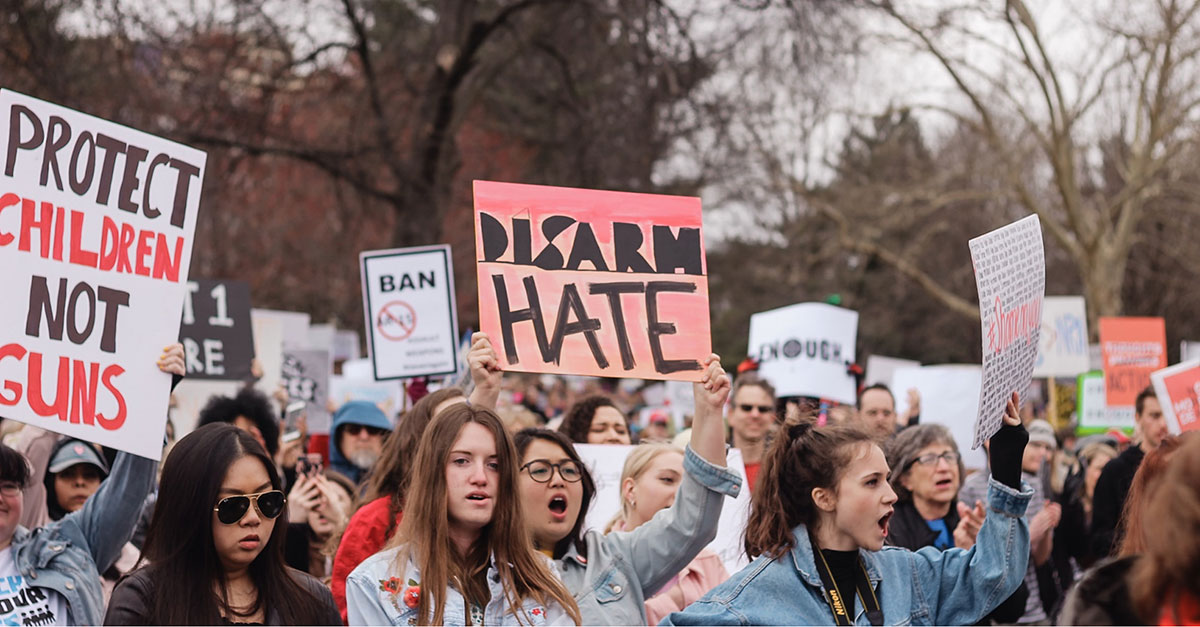Three Promises Amid Violence

CrossOver reflection for Week 36 • Beginning August 11, 2019
We Make the Road by Walking, Chapter 49
Rev. Katie Ladd
Like a lot of pastors, I had to change my sermon at the last minute last Sunday because of yet another shooting—wait, no, two mass shootings, one in El Paso, TX and one in Dayton, OH. Of course, these were not the only shootings around the country last weekend. In Chicago, one article I read said there were five shootings. There was even a shooting Sunday morning in Seattle. At the least, the shooting in El Paso was fueled by white supremacy. It’s hard. The soul gets so weary. What can we do with the weary soul? How do we believe in God’s good vision with so much violence all around us?
In chapter 49 of Brian McLaren’s book We Make the Road by Walking, he focuses on the role of judgment in bringing about reconciliation, harmony, and healing. Called “Spirit of Holiness,” he tells us this:
“Jesus promised HIS followers three things. First, their lives would not be easy. Second, they would never be alone. Third, in the end all will be well. But all is not well…how does God get us from here to there? How does God put things right?”
McLaren believes that judgment is the way that God puts things right. It is the way from here to there. When deployed correctly, judgment isn’t just a punitive tool. It is a wise action that names harm and sets to work at redressing it. Its goal is restoration. In the end—in the “final restoration”—everything will be made new.
Many of us have very complicated histories with the word “judgment,” and so we shy away from it. For many of us, it can seem unredeemable. What would it be like to embrace it—not as it has been used to harm, demean, and ridicule—but as a justifying act? How would that call us to act as a community? Can we possibly divorce “judgment” from “judgmentalism?” It’s an intriguing thought.
Even if we decide that we can’t use the word “judgment,” perhaps we might employ the Spirit of Holiness to address the brokenness in our society. We could allow the Spirit of Holiness to move us closer to God’s good vision for what our shared lives might look like. We need God’s restorative action around our country’s addiction to violence. God’s Spirit is required to move us to deep change. Such change would include more than social media expressions of outrage at yet more lives lost.
In addressing the white supremacy at the heart of many mass shootings, we have to tell hard truths, truths that in the end liberate us all. In addressing the deep pain of suicide by shooting, we tell hard stories of isolation and desperation. In addressing the insidiousness of domestic violence that ends in gun violence, we reveal closely held secrets of family dysfunction. Truth-telling must be part of moving us forward in our communities. Truth-telling is a purifying fire that burns up the garbage and leaves the substance of life behind. This is the work of the Spirit of Holiness.
At The Well, we invite people to give us guns so that we might transform them into garden tools. This practice will not end all violence in all places. The quest for one answer to do all of that work is folly. However, transforming one gun is a symbolic act that centers us on life in a death-obsessed culture. It is part, if a little one, of changing our relationship with violence. This, too, is the work of the Spirit of Holiness.
If you feel despondent at the violence all around us, remember the three things McLaren tells us are Jesus’ promises. Life as Jesus’ disciples isn’t easy. Bearing witness to violence isn’t easy. You are not alone. In our communities of faith, others accompany you in bearing this witness. Also, you are not alone in your deep soul weariness. Many of us share in it. And, when we employ the courage to see and name harm and redress them, we move, even if only by fits and starts, closer to God’s dream for us and the world we share.
Rev. Katie Ladd is the pastor of Queen Anne United Methodist Church in Seattle, Washington. She is also the founder and director of The Well.
Todd Bartlett
Katie, thank you for your reflection on judgment and the current state of affairs. Let us walk together toward God’s dream. Peace, Todd